By Adam Pagnucco.
Broadly speaking, there are two kinds of non-profits (aside from labor unions) that interact with state and local governments. There are non-profit service providers. They stick to their missions (providing housing, food, education, healthcare and more), ask governments for public funding for those missions and stay out of electoral politics. Then there are political advocacy groups. They lobby governments for their agendas and sometimes play in elections, but they do not take tax dollars. Elected officials are used to dealing with both kinds of groups.
And then there is CASA, the immigrant rights group that set off a huge conflagration over its remarks on the Israel-Hamas war. CASA is not just a non-profit service provider or an advocacy organization.
It’s both. And that has become a challenge for our elected officials as well as taxpayers.
The founder of CASA is Gustavo Torres, an immigrant from Colombia who started the group decades ago in a church basement. Torres is a brilliant organizer who is regularly named as one of the most influential people in Montgomery County as well as, increasingly, the entire mid-Atlantic region. Few if any people in our public policy space have achieved Torres’s level of success from virtually nothing.
Casa Inc., commonly known as CASA, is Torres’s primary operating entity. It was founded in 1985 as a 501(c)(3). That’s a tax status assigned by the U.S. Internal Revenue Service (IRS) to charitable organizations. Their exempt purposes are defined as “charitable, religious, educational, scientific, literary, testing for public safety, fostering national or international amateur sports competition, and preventing cruelty to children or animals.” When it comes to political advocacy, the IRS comments:
In general, no organization may qualify for section 501(c)(3) status if a substantial part of its activities is attempting to influence legislation (commonly known as lobbying). A 501(c)(3) organization may engage in some lobbying, but too much lobbying activity risks loss of tax-exempt status.
CASA’s sister organization is Casa in Action, which is a 501(c)(4) and is allowed by the IRS to engage in lobbying and limited electoral activity. Among other things, Casa in Action endorses candidates and has a Super PAC. While its legal organization and funding is segregated from Casa Inc., it shares a common office address. According to the 2022 IRS 990 filings of the two organizations, Torres is the executive director of Casa Inc. and the president of Casa in Action. The two groups share four senior staffers who have identical titles listed in each filing. Casa in Action acknowledges the relationship in its filing, writing, “Casa in Action, Inc. is affiliated with CASA, Inc. (EIN 52-1372972). CASA, Inc. is considered a common pay agent and reports all employees on its Form W-3. Salaries reported on Casa in Action are allocated portions of those employees’ time. There is no separate W-3 filed by Casa in Action.”
To be fair to CASA, it is far from unique in its dual structure. AARP, March for Our Lives, Planned Parenthood, the NRA and the Sierra Club are among the many groups who maintain both 501(c)(3) and 501(c)(4) entities.
CASA’s original mission was providing services to immigrants, a mission it still pursues today. It receives substantial funding from a variety of governments and other entities that support benefit navigation services, tenant counseling, employment, training, financial assistance, healthcare assistance, immigration legal support and more. The graphic below provided by Montgomery County’s public information office shows that CASA has $16.4 million of active contracts with our county government as of this moment.
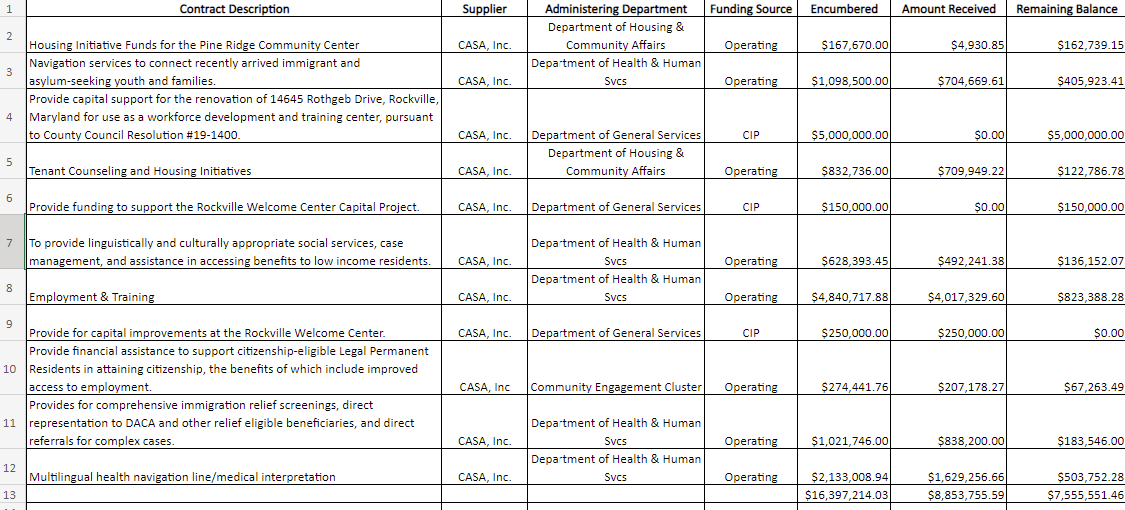
It doesn’t end there. Last year, County Executive Marc Elrich asked the county council to approve a 99-year lease for CASA at “a nominal sum” for a county-owned building at 14645 Rothgeb Drive in Rockville. The council did so unanimously and waived the requirement that the lease be made at fair market value. On top of that, the council approved Elrich’s request for $5 million in capital money for improvements to the building.
That’s just the tip of the iceberg. CASA has received support from other governments over the years including Baltimore City, Baltimore County, Prince George’s County, the State of Maryland, Fairfax County, the State of Virginia, the federal government and more. The Washington Post reported that it received a $1.5 million donation from Hugo Chavez’s Venezuelan government in 2008.
CASA does not itemize its government grants and contracts, but it has reported their aggregate amounts in its IRS 990 filings since 2012. The table below shows the amounts it has reported, along with total revenues and net assets, since then.
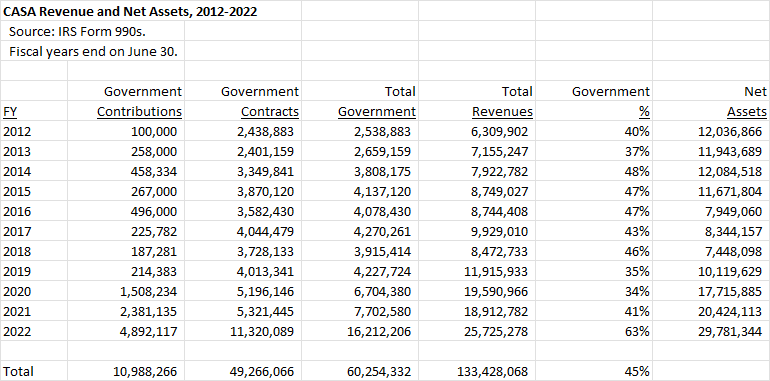
As seen above, CASA has tripled its revenues and quadrupled its net assets since 2018. The principal reason is that its government support has more than quadrupled during that time. Without government money, CASA would be a fraction of what it is today.
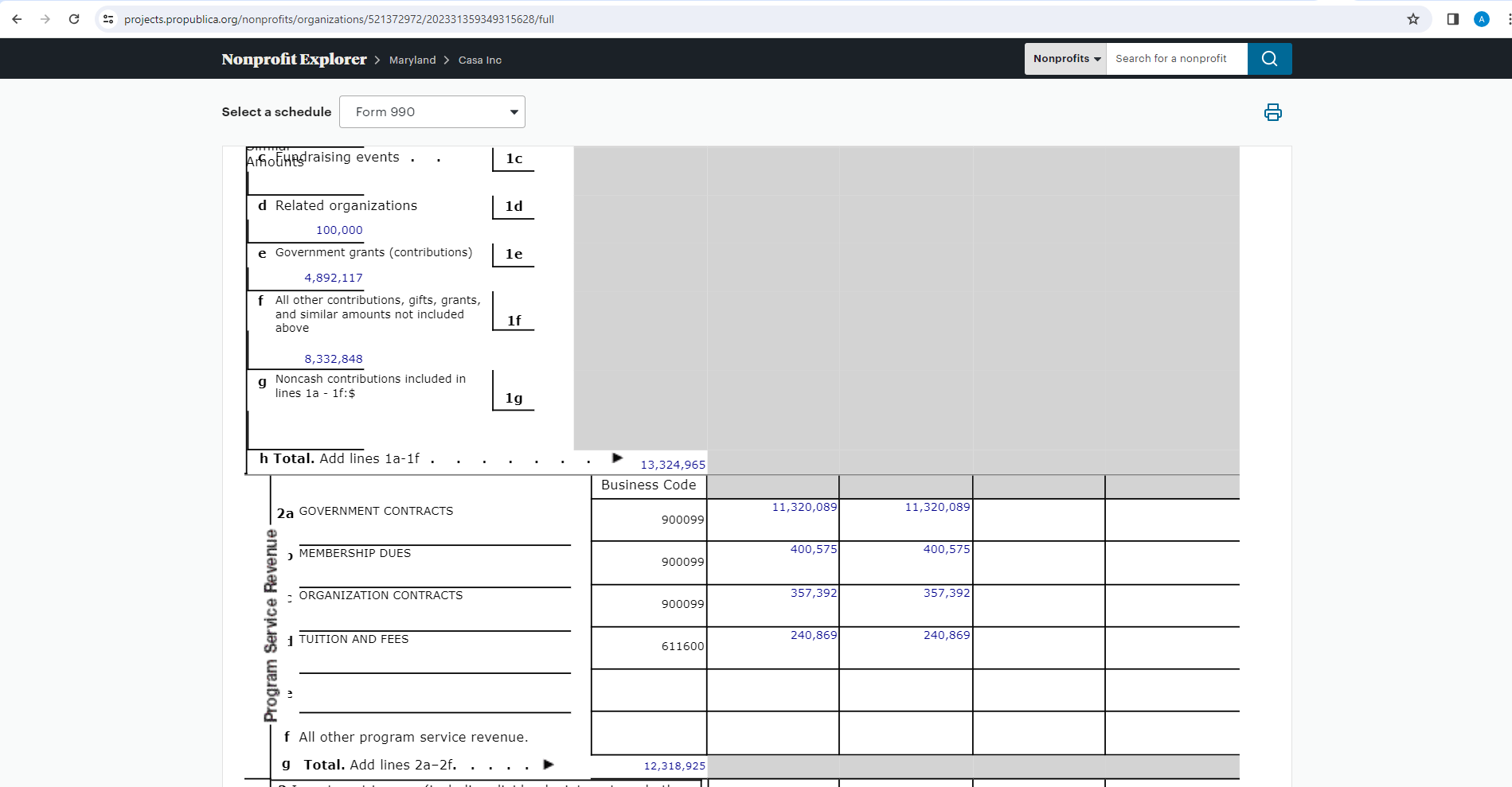
The above extract from CASA’s 2022 IRS 990 filing shows its reported government funding for that year.
While it collects millions in tax dollars, CASA is also an aggressive and powerful advocacy group. It openly proclaims its agenda on its website, takes credit for passing numerous legislative priorities and explicitly uses the term “lobby.” It does so under its CASA identity, not just its Casa in Action identity.
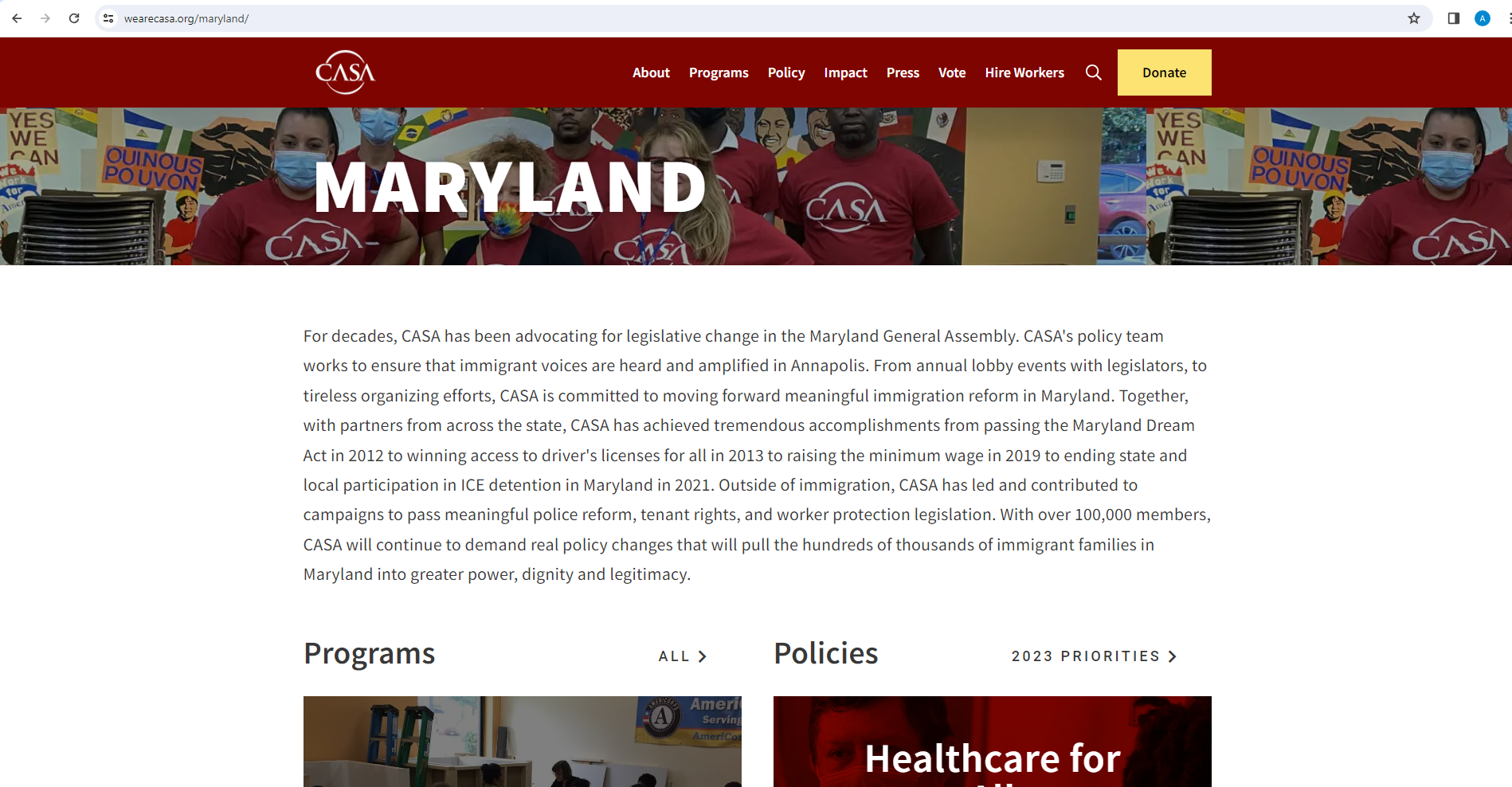
CASA is loud and proud when discussing its lobbying.
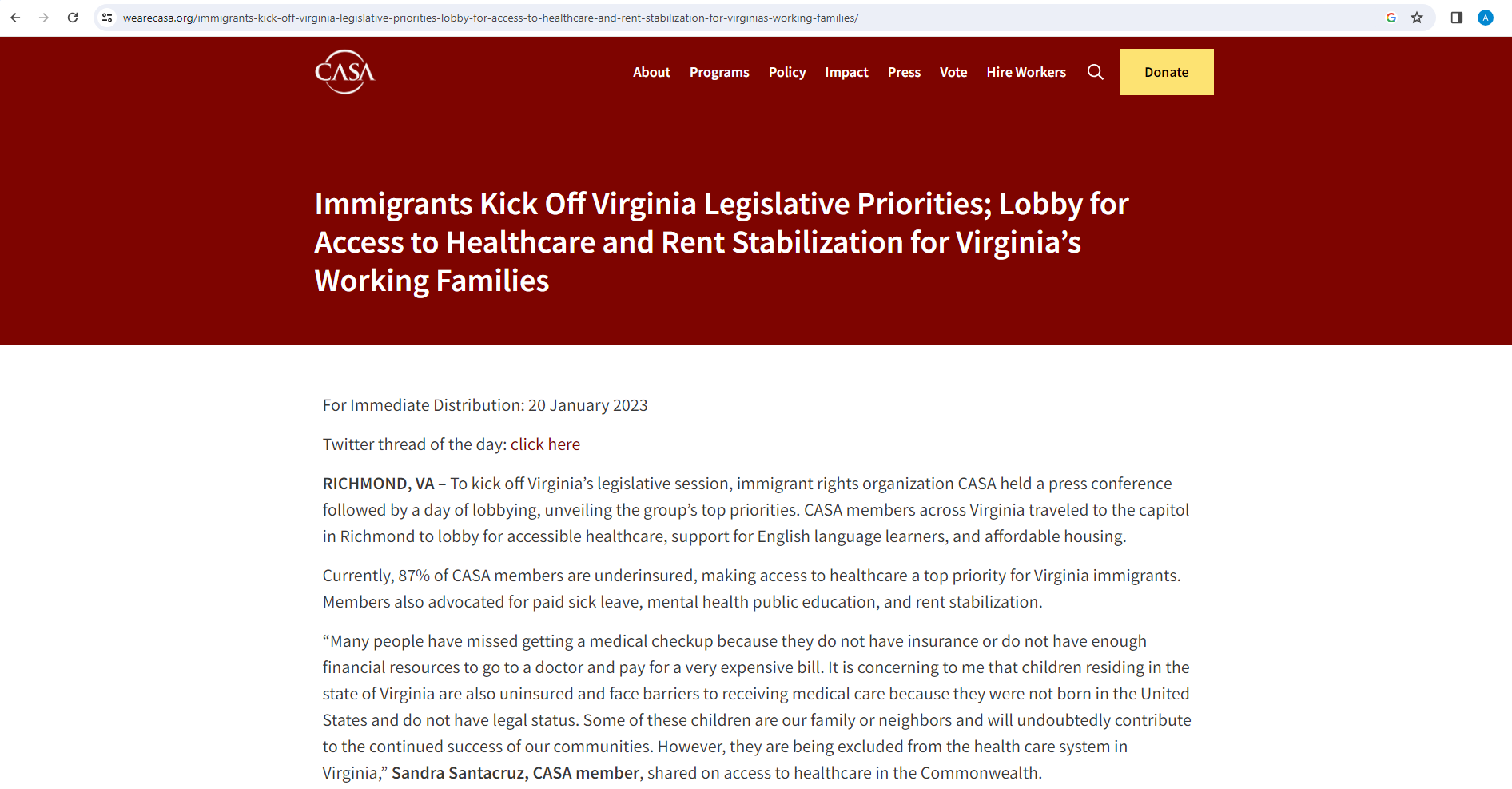
CASA gets ready to lobby in Virginia.
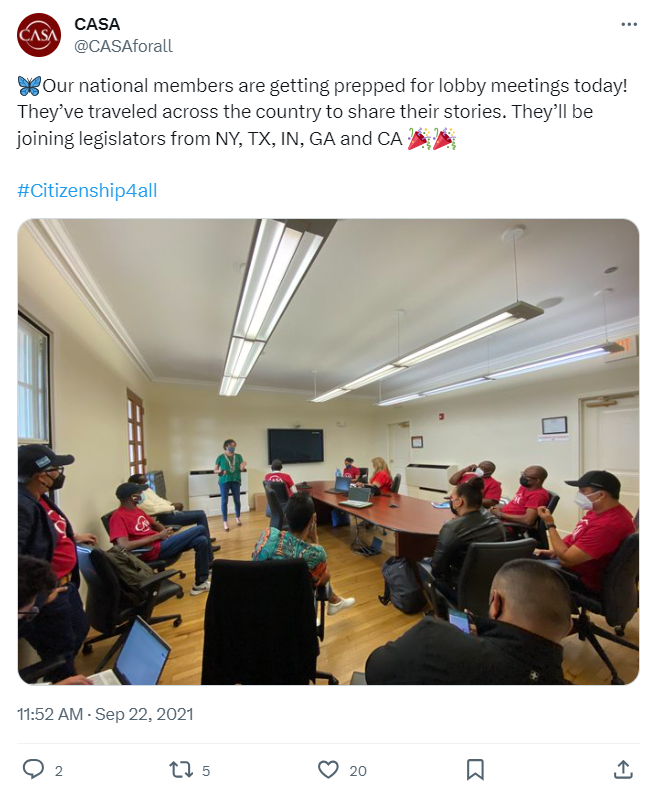
CASA gets ready to lobby on Twitter.
Accordingly, CASA is not just a non-profit service provider. It’s not just an advocacy group. It’s both. And right now, that’s an issue as its comments about the Israel-Hamas war have set off a firestorm that has called into question whether it should receive public funding. Non-profit service providers who avoid speaking out on political issues don’t face this problem.
That said, this is not just about CASA. It’s also about the elected officials who fund it.
For many years, state and county politicians have accepted endorsements from CASA’s political arm (Casa in Action), directed tax money to CASA’s 501(c)(3) organization and offered no protest when they agreed with CASA’s advocacy or at least found it within their accepted norms. But now that CASA has said something they find unacceptable, they squawk. The real problem for the elected officials is that an arrangement that was once politically convenient for them has – at least for the moment – become politically problematic. Let’s keep in mind that this is an arrangement that these same elected officials have created.
For its own good, CASA should decide whether it wants to be a non-profit services provider or a political advocacy organization. The two roles are becoming hard to maintain simultaneously. And as CASA expands into other states, Republican officeholders and their allies may very well challenge its tax status, its public funding or both. Such controversies could endanger CASA’s mission and perhaps its very existence.
As for our elected officials, they must sever any association – direct or indirect – between tax dollars and lobbying. Tax dollars are OUR money – the taxpayers’ money. They should be used for US. And they should never be used to lobby for political agendas – left, right or otherwise.
Will any Maryland elected official act on this principle? Or will all of this just blow over by the next election?
